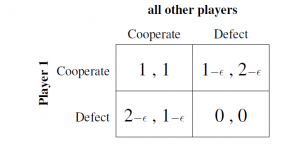The Tragedy of the Commons is Not a Nash Equilibrium
Hardin’s tragedy of the commons is a popular metaphor that is commonly described as a Nash equilibrium. In a public resource (such as the titular grazing commons) used by many entities (herders, for example), the resource will be depleted entirely by the self-serving entities, and while each entity is acting to maximize personal gain (at the cost of others), this collective action causes a depletion so complete that nobody gets anything. This concept sounds like a Nash equilibrium, but in fact is not.
The rules set out by Hardin are as follows:
As a rationale being, each herdsman seeks to maximize his gain. Explicitly or implicitly, more or less
consciously, he asks, “what is the utility to me of adding one more animal to my herd?” This utility has a
negative and a positive component.
(1) The positive component is a function of the increment of one animal. Since the herdsman receives all
the proceeds from the sale of the additional animal, the positive utility is nearly +1.
(2) The negative component is a function of the additional overgrazing created by one more animal. Since, however, the effects of overgrazing are shared by all […], the negative utility for any particular decision-making herdsman is only a fraction of -1.
Adding together the component particular utilities, the rational herdsman concludes that the only sensible course for him to pursue is to add another animal to his herd. And another; and another… But this is the conclusion reached by each and every rational herdsman sharing a commons. Therein is the tragedy. Each man is locked into a system that compels him to increase his herd without limit—in a world that is limited.
By drawing out the system that Hardin described, we see very clearly that the “tragedy” described by Hardin in the common resource is not a true Nash Equilibrium. The defect/defect choice is not a Nash equilibrium, and instead this problem is a challenge in cooperation.
This finding lends more hope to the concept of resource preservation. We humans are not doomed to deplete all of our resources without regulation; other cooperative options exist. In addition, the lack of applicability of a Nash equilibrium means that we must model to greater complexity the strategies we need to ensure resource sustainability – a simple fix is not enough.
www.mdpi.com/2071-1050/4/8/1776/pdf

